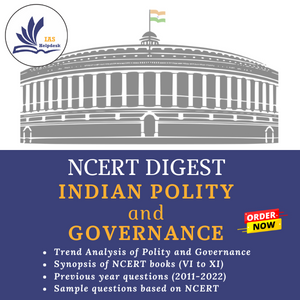What is Privilege Motion?
Description
Privilege Motion
All Members of Parliament (MPs) enjoy rights and immunities,
individually and collectively, so that they can discharge their duties and functions
effectively. Any instance when these rights and immunities are disregarded by
any member of Lok Sabha or Rajya Sabha is an offence, called ‘breach of
privilege’, which is punishable under the Laws of Parliament.
Any member from either house can move a notice in the form of a motion
against the member who he/she thinks is guilty of the breach of privilege. Both
Houses of the Parliament reserve the right to punish any action of contempt
(not necessarily breach of privilege) which is against its authority and
dignity, as per the laws.
Rules
The rules governing the privilege are mentioned in the Rule No 222 in Chapter 20 of the Lok Sabha Rule Book and Rule 187 in
Chapter 16 of the Rajya Sabha rulebook. The rules explain
that any member of the House may, with the consent of the Speaker or the
Chairperson, raise a question involving an incident that he or she considers a
breach of privilege either of a member or of the House or of a committee. The
notice, however, has to be about a recent incident and should need the
intervention of the House. These notices have to be submitted before 10 am to
the Speaker or the Chairperson of the House.
What is the role of the Lok Sabha Speaker and Rajya Sabha Chairperson?
The speaker of Lok Sabha and the Chairperson of Rajya
Sabha are the first level of scrutiny of a privilege motion in the two Houses of
Parliament. They can either take a decision on the privilege motion or can also
refer it to the privileges committee of Parliament. Once the Speaker or the
House Chairperson gives consent under Rule 222, the concerned member is allowed
to explain himself or herself.
What is the Privileges
Committee?
The Speaker of Lok Sabha nominates a committee of
privileges consisting of 15 members of parliament from each party. The report
prepared by the committee is submitted to the House for its consideration. The
Speaker may also allow a half-hour debate on the report by the committee before
passing orders or directing that the report be tabled before the House. A
resolution is passed.
Have Privilege Motions been
passed in Parliament in the past?
Most of the privilege motions passed in the Parliament in
the past have been rejected. Penal actions have been recommended only in a few,
so far.
Among the most significant privilege motions
passed so far was in 1978 against Indira Gandhi. The then Home Minister Charan
Singh had moved a resolution of breach of privilege against her on the basis of
observations made by Justice Shah Commission, which investigated the excesses
during the Emergency. Indira Gandhi, who had just won the Lok Sabha elections
from Chikmagalur, was expelled from the House.
In 1976, BJP MP Subramanian Swamy was expelled from Rajya
Sabha for bringing disgrace to Parliament through his interviews to foreign
publications.
In 1961, editor of ‘Blitz’ RK Karanjia was indicted with
gross breach of privilege after the publication put out an article that
publicly castigated Congress veteran JB Kripalani. Karanjia was reprimanded in
Lok Sabha and the gallery pass of his correspondent was annulled.
In the Winter Session of 2017, BJP MP Bhupendra Yadav, now Union Minister
of Labour and Environment, had moved a privilege motion against Rahul Gandhi in
Rajya Sabha during Zero Hour. Yadav had accused Rahul of “intentionally,
maliciously and disrespectfully” twisting the name of Finance Minister Arun
Jaitley in a tweet. Rahul had referred to Jaitley as “Jaitlie”. However, Rajya
Sabha Chairperson Venkaiah Naidu had cautioned Yadav against moving the motion
as Rahul was not present in the House to defend himself.

